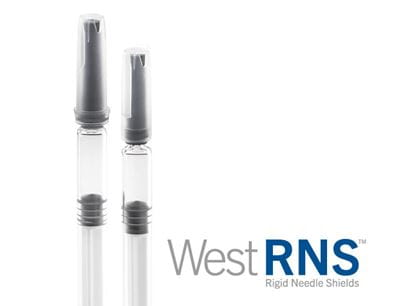West Rigid Needle Shields – Proper Design and Materials Help Ensure the Right Performance
The needle of a pre-filled syringe is extremely important. From manufacture, through packaging/transportation, to patient delivery – if the needle is not protected, the drug product cannot be delivered effectively. To protect needles to ensure patient safety, West has developed Rigid Needle Shields (RNS) in two sizes: 1/2” for subcutaneous injections (e.g., heparins) and 5/8” for intramuscular injections (e.g., vaccines). RNS consist of a two-part system – a soft rubber inner shell and a perforated, hard polypropylene outer shell. This system maintains container closure integrity (CCI) for both an ISO 11040 glass syringe with staked needle, and a polymer-based syringe (e.g., Daikyo Crystal Zenith® insert needle syringe).
![]()

Good performance requires proper design and proper material selection. The rubber inner shell comprises specially-selected polyisprene-based formulations with excellent gas permeability to enable sterilization with either steam or ethylene oxide. West further recommends formulations optimized to resist degradation from ozone exposure (resultant cracking would lead to loss of CCI). To avoid risk of allergic reactions, rubber is not made with dry natural rubber latex. The perforated polypropylene shell enables easy access of steam or ethylene oxide.
In collaboration with commercial partners West has tested RNS rigorously after sterilization. Two sealing areas, one at the tip of the cannula and one on the cone of the syringe, help to ensure good CCI. This was confirmed by high pressure (applied to syringe plunger) leak testing. Simulated air transport (fluctuations in air pressure) likewise showed no loss of CCI. As the tip of the cannula pierces the rubber shell during assembly, there is no issue with coring or fragmentation. Pull-off force measurements demonstrated convenient removal of the RNS from syringe. A further benefit – employment of RNS on a commercial assembly line requires only minor adjustments, and does not require any format part changes.
For more information, contact your Account Manager or Technical Customer Support representative.



